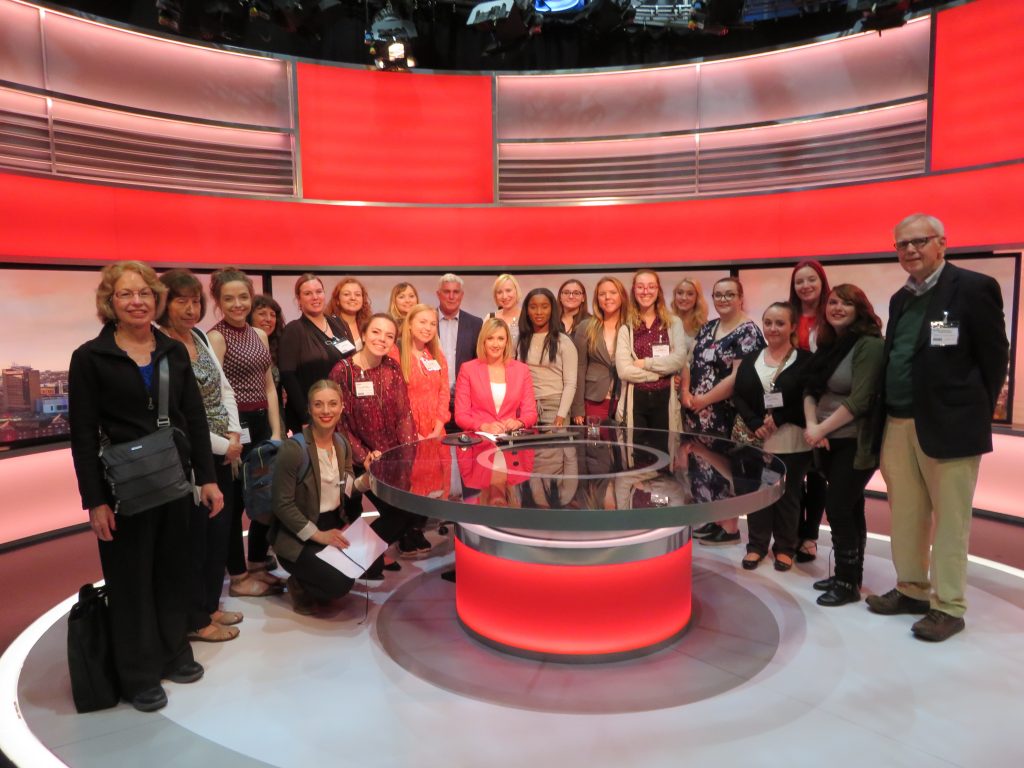
By: Kristin Snapp
Student journalists may have thought they’d have a hard time finding Belfast journalists to tell them they benefitted from The Troubles in Northern Ireland. But a leading journalist at BBC Northern Ireland believes that did indeed occur.
The Belfast office, once a target of bombings 30-40 years ago during the Troubles, is now the most successful BBC office outside of London, largely as a result of their history.
“We have one of the strongest newsrooms outside of London, and one of the biggest,” Kathleen Carragher, head of news at BBC Northern Ireland said. “And I do think that’s because of the Troubles.”
“This society is unrecognizable to what it was 30-40 years ago,” Carragher, who oversees radio and TV operations as well as digital said. “But, when you scratch the surface, you still have an alliance on either side.
Carragher is referring to the two sides of the Troubles, which riddled much of Northern Ireland for 30 years starting around 1968. The conflict was between Unionists – most often Protestants, who stand for Northern Ireland to remain a part of the UK – and Nationalists, who are predominantly Catholics who want a united Ireland, separate from the UK.
Because BBC receives revenue from the television license fee the British government collects, the Belfast BBC news coverage was questioned. Both Carragher and reporter Dan Stanton told Point Park students that the bureau’s journalists remained true to the BBC’s independence from governmental oversight during The Troubles and produced excellent coverage of that era.
Carragher believes the Troubles created a “news-hungry” society who wanted to keep up with what was happening because the countries were divided and on the brink of tremendous change for years.
Since Brexit, Britain’s vote to exit the European Union, that hunger for news in Northern Ireland has resurged because the vote carries many implications for Northern Ireland.
Brexit will fix a physical land border between Northern Ireland and the Republic of Ireland. Currently, the only signifier that one has crossed from the Republic into Northern Ireland are the road signs warning drivers that speed is measured in miles per hour, instead of kilometers per hour.
BBC Northern Ireland has remained firm in reporting the uncertainty of the situation, as it is all speculative as of now.
“We have to report and reflect,” Carragher said. “The truth of it is, we won’t know until it’s done.”
There is one piece of certainty coming from the Brexit vote, though. Surveys show, since the vote, more Northern Irish people are committed to staying a part of the UK – which Carragher thinks is a logical move.
Northern Ireland feeds off of money from Westminster that the Republic of Ireland does not receive, and it could not afford to provide enough support for Belfast and beyond. In a small country, that funding is necessary to keep the society and many of its businesses afloat, she said.
BBC Northern Ireland still makes its money off that licensing fee that TV owners are required to pay the British government to see programming. The current fee in Northern Ireland is 147 pounds annually.
“No one’s ever come up with a better model of funding,” Carragher said. “We are immensely privileged.”
The licensing fee means that BBC does not have to cut shows or programs due to a lack of rating, which is a privilege most news organizations and channels as a whole do not have.
BBC Northern Ireland is committed to improving news literacy for all, which it does by encouraging the use of computers in public libraries and employing vans to drive around and show the public how to consume news.
“It’s the BBC’s responsibility to be making services available to all,” Carragher said. “Now is another tipping point in history where we just really don’t know what’s going to come.”
In addition to talking to Carragher and Stanton about the news cycle and history of BBC Northern Ireland, students were split into groups and toured the radio and television facilities and get a feel for a BBC Northern Ireland workday. They also saw some live productions in progress and viewed the main television studio, meeting a presenter and some technical staff.